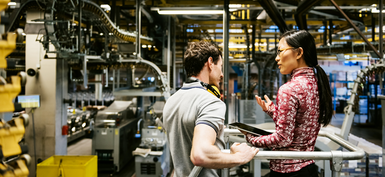Mar 10th 2023
The Future of Automation Depends on Relationships Built Today
While technology is certainly an important component of automation, the role of warm relationships, or interpersonal connections, cannot be overlooked. In fact, the success of automation often depends on the ability of humans and machines to work together in a seamless, collaborative way.
One example of this can be seen in the development of collaborative robots, or "cobots," which are designed to work alongside human workers. These machines are equipped with advanced sensors and algorithms that allow them to adapt to their environment and work safely alongside humans. However, the success of these cobots also depends on the ability of humans to communicate effectively with them and to understand their capabilities and limitations.
Another example of the importance of warm relationships in automation can be seen in the field of customer service. While chatbots and other AI-driven systems are becoming increasingly popular for handling routine customer inquiries, many customers still prefer to interact with a human agent who can provide a more personalized and empathetic response. In fact, research has shown that customers are more likely to remain loyal to a company if they feel that they have a strong relationship with a human representative.
According to McKinsey, if the manufacturing industry is ready to take advantage of the upcoming developments, such as advancements in manufacturing technology, yearly manufacturing value added in the United States might increase by up to $530 billion (20 percent) by 2025 compared to present patterns. Taking advantage of these possibilities "should be a national priority given the importance of manufacturing to the larger economy," the paper said. While all aspects of the U.S. manufacturing sector will be impacted by these developments, smaller manufacturers will over the next ten years encounter possibilities and obstacles that are slightly different from those faced by bigger businesses.
Advanced manufacturing will become the norm rather than the exception as "Industry 4.0" takes hold. According to the McKinsey report, "Industry 4.0" is the confluence of several technological advancements, including the expansion of data availability, advances in machine learning, new types of human-machine interfaces (like touch interfaces), and the capacity to translate digital instructions into tangible products. Even smaller manufacturers will need to embrace these technologies in order to boost productivity and improve their competitiveness as this convergence becomes the norm.
One of the Industry 4.0 developments that affects manufacturers the most immediately is smart manufacturing, which refers to the union of information and operational technology. Several industrial applications are included by this description, including computer-aided design software and tablet or computer-based remote machine monitoring. Robots fall under the broad category of "smart manufacturing," and while investing in them can be expensive and time-consuming in the beginning, they eventually offer a great chance to either achieve automated, cost-effective, high-volume operations or pursue highly customizable production capabilities.
When picking a supplier or an equipment, businesses would traditionally prioritize cost and return on investment. Yet, the transactional nature of the relationship between the CPG and the OEM is giving way to one of collaboration, support, and on-going cooperation.
Establishing legally bound relationships, for instance through longer-term service contracts, machinery as a service (MaaS), longer warranties, and improved training services, is very advantageous to both CPGs and OEMs.
In short, while technology will continue to play an important role in automation, the success of these systems will ultimately depend on the ability of humans and machines to work together in a collaborative and mutually supportive way. This will require a greater emphasis on building warm, empathetic relationships between humans and machines, and on designing automation systems that prioritize human needs and values. Located outside Philadelphia, Automation Distribution has application engineers and sales representatives covering Eastern Pennsylvania, Delaware, New Jersey, Greater New York City, Washington D.C., and Virginia. Introduce yourself today by contacting us to learn more about our advanced manufacturing technology products and training services.
Sources: ChatGPT; https://www.nist.gov/blogs/manufacturing-innovatio...;https://www.oemmagazine.org/business/business-mana...

